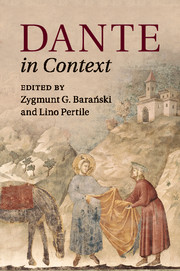Book contents
- Frontmatter
- Dedication
- Contents
- List of illustrations
- List of maps
- Notes on contributors
- Chronology
- Abbreviations and note on translations
- Introduction
- Part I Politics and society
- Part II Intellectual traditions
- Part III Linguistic and literary cultures
- Part IV Visual and performative culture
- Part V Dante: life, works, and reception
- 27 Life
- 28 Works
- 29 Textual transmission
- 30 Early reception (1290–1481)
- Further reading
- Index
28 - Works
from Part V - Dante: life, works, and reception
Published online by Cambridge University Press: 05 October 2015
- Frontmatter
- Dedication
- Contents
- List of illustrations
- List of maps
- Notes on contributors
- Chronology
- Abbreviations and note on translations
- Introduction
- Part I Politics and society
- Part II Intellectual traditions
- Part III Linguistic and literary cultures
- Part IV Visual and performative culture
- Part V Dante: life, works, and reception
- 27 Life
- 28 Works
- 29 Textual transmission
- 30 Early reception (1290–1481)
- Further reading
- Index
Summary
Dante did not have an easy life. The loss of his mother when he was still a child, and of his father ten years later, which compelled him to take charge of his family when he was barely eighteen; his early, prearranged marriage, admittedly not unusual at the time; the addition of his three or four children to a household that could only count on a modest income; the death of Beatrice in 1290, and that of Guido Cavalcanti (b. 1250/59) ten years later in circumstances for which Dante could feel partly responsible; the bitter disappointment of his political career in Florence; the unspeakable offence of the trial in absentia, and the wound of the capital sentence, extended eventually to his children; the twenty years of exile, spent wandering from court to court without a permanent home for himself and his wife and children; finally, his own death of malaria when he was fifty-six (not young for the fourteenth century, but not old either): this definitely looks like a difficult life. What is astonishing is that, despite the many obstacles, Dante was able to write a body of work that placed him permanently at the forefront not only of Italian literature, but also of Italian language and philosophical studies. There is no doubt that the difficulties he encountered in life stimulated his work as a writer; indeed it can be argued that we owe his masterpiece, the Commedia, to his experiences as a politician and his exile. Dante's writing is quintessentially autobiographical, which is not all that unusual in the Trecento. What distinguishes Dante's work is the way in which historical events, poetic autobiography, and reflection on poetry are inextricably interwoven in it. From its very inception, Dante's poetry appears to be a self-conscious elaboration of personal experiences, where the lines between dreams, imaginings, and real events are blurred and crossed. This procedure was conventional among Dante's circle of friends and correspondents; however, the coherence and originality with which he developed it made him unique. Its first, but already mature and refined, result is the Vita nova, probably begun in 1292 but certainly written after Beatrice's death in 1290, and before 1295.
Rime
Dante's lyric production spans twenty-five years, from the early 1280s to 1306–07, when he began to compose his major poem.
- Type
- Chapter
- Information
- Dante in Context , pp. 475 - 508Publisher: Cambridge University PressPrint publication year: 2015
- 1
- Cited by



